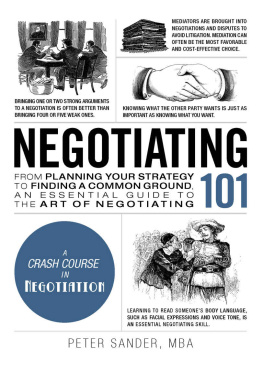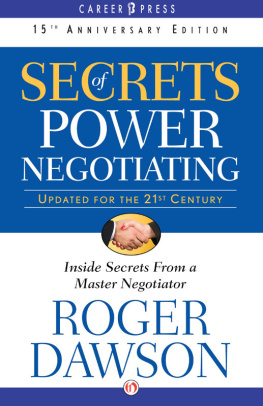Thank you for downloading this Simon & Schuster ebook.
Get a FREE ebook when you join our mailing list. Plus, get updates on new releases, deals, recommended reads, and more from Simon & Schuster. Click below to sign up and see terms and conditions.
CLICK HERE TO SIGN UP
Already a subscriber? Provide your email again so we can register this ebook and send you more of what you like to read. You will continue to receive exclusive offers in your inbox.
Contents
Dedication
Negotiating professionals, which includes most of you, far outnumber professional negotiators. It is mainly to you that I dedicate this book.
INTRODUCTION
Like most people, you work for a living. You run a small business. Or youre a position player in a larger one. Or youre employed in a nonprofit or public agency. Or perhaps youre not part of the work force at all.
Sooner or later (most likely sooner) you will need or want something from someone else. That someone else might be another individual, another organization, or an individual or organization inside or outside your business or organization. As for what you need or what, it could be a new hire, a labor deal, a supply of raw material, a professional consultation, financial advice, or even a meeting room. You need something from someone, and its important.
That something may be large or it may be small. Now you have to meet with someone to obtain it. Since resources are precious, you have to try to get the best deal. Youll have to do a little give and take to get the best value for your money, the best value for your time, the best value for whatever resources you have to offer.
You have to negotiate .
It sounds scary. We hear of tense, drawn-out negotiations about labor agreements or peace talks to stop wars. The very idea of being on stage with such high stakes in the balance would scare most of us to death.
Fortunately most of our negotiations in real life are smaller and less criticalbut still important. A meeting or two, even a phone call or exchange of emails might do it. In todays ever-faster business world, rapid-fire technology tools accelerate the speed of negotiations.
But however brief the negotiations, and no matter what youre negotiating for, you still need to know what youre doing. You want a deal that meets your needs, one that creates the value you seek without giving away the store.
Thats where Negotiating 101 comes in. This book gives you the basic tools, skills, defenses, and processes to become a more confident and effective negotiatorwhether its your full-time job or something you do once in a while, and whether its for a $10 million contract at work or the use of the family car with your teenage boys.
The same principles apply.
THE MAIN IDEA(S)
Negotiating 101 covers the main ideas, strategies, tactics, responses, and skills to help you through any kind of negotiation with any counterparty, anywhere. The underlying principles and themes of negotiation youll see throughout the book include:
Negotiating is everywhere. You negotiate while at work, at home, even during leisure activities. You may negotiate contracts for jetliners, for cleaning services, or with your kids for dinnertime; these are all negotiations. They differ in size and scope only, but not the basics.
Negotiating may be your profession, but more likely it is part of your profession. A few of us negotiate for a living. The rest of usa vast majoritymust negotiate to get the rest of our jobs done.
Win-win is the way. When both sides win and meet some of their goals, musts, and wants from the negotiation, then the process goes faster, easier, and usually comes out better for everyone. When one side plays to win it all at the others expense, it creates short-term pain and damages the long-term relationship.
Negotiations should be fast, friendly, and effective. This favorite phrase should describe most interactions in your business or organizationnegotiations and customer relationships in particular. FFE works better, takes less time, and produces lasting results and loyalty.
The counterparty is not the enemy. When the counterparty is perceived as the enemy, the negotiation becomes much more negative, antagonistic, personal, and about ego. When you treat someone like an enemy, they do the same, and the win-win mentality is gone forever. I use the term counterparty not opponent or adversary or similar termsthroughout the book.
Negotiations should be for the long term. At the end of the day, negotiation is about reputation (yours) and relationship (with the counterparty). Doubtless youre going to have to do this again somewhere down the road, and likely with the same counterparty.
HOW THIS BOOK IS ORGANIZED
Negotiating 101 breaks down into six major topics, or parts:
Negotiation basics, including the definition and importance of negotiation, are covered in Chapters 1 and 2.
Preparation, the lifeblood of negotiation, is discussed in Chapter 3. The topics covered include but are not limited to research, knowing your counterparties, preparing for the venue, agendas, and visualizing the negotiation from start to finish.
Chapters 4 through 6 cover negotiating styles, strategies, tactics, ploys, verbal and nonverbal language, and defensesboth of the prepared beforehand and spontaneous on-stage varieties.
Common negotiating pitfalls and how to avoid them are covered in Chapter 7, while using or defending against high-pressure negotiating tactics is the subject of Chapter 8.
Chapters 9 and 10 explain how to close and finalize a negotiation. Major elements of creating a contract are also covered.
Chapter 11 concludes the book by reinforcing the importance of learning from every negotiation and using it to enhance both your reputation and your long-term relationship, be it with your counterparties or your coworkers and managers.
In the immortal, implied words of most of us who have done it: Negotiate well and prosper!
Chapter 1
The Negotiating Imperative
So you think you dont ever have to negotiate? Life just moves forward. In business, negotiating is someone elses job, right? For you, its just a discussion. And when you get home from work and have issues to settle with your family, thats just a discussion, too. Right?
Hardly. No matter what you do in todays fast-paced business (and personal) world, every day youll encounter things you need or want. Not just things, but also behaviors and actions. Discuss them? Yes, it starts with that. But youre not just discussingyoure working out a deal. Youre working out an agreement .
That agreement can be in the interest of your own individual achievement, your workgroups achievement, or your organizations achievement as a whole. You want to go get it. That requires negotiation. Especially if you have to give up somethingand the other party has to give up somethingto reach an agreement.
At its roots, negotiation is the art and sciencethe processof getting what you want. This chapter describes further what negotiation is (and isnt), how it fits into todays business and organizational context, and what is (and isnt) new about negotiation today.
WHAT DO WE MEAN BY NEGOTIATION?
What Negotiation Is, What It Means, and Why
Say you run a video production business: Filmographic Productions. Through that business you make some of the best video shorts in town. You make excellent local commercials, short training and awareness pieces for business and nonprofit entities, and occasionally some cinema-quality shots for movie producers.
















